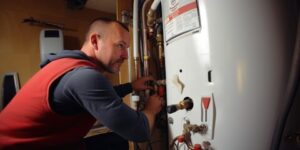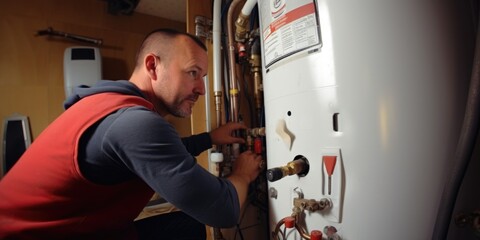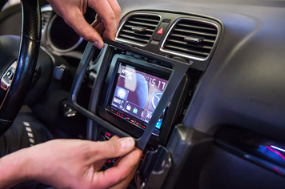A water heater is a complex and potentially dangerous unit. It should only be repaired by professional plumbers. They can handle most repairs, such as flushing to remove sediment buildup, relighting the pilot light, and testing the pressure relief valve. Contact Water Heater Replacement Denver for professional help.
Leaks around your water heater are dangerous and must be repaired promptly. They can cause significant water damage and mold growth that compromises indoor air quality and puts the structure of your home in danger.
While you may be able to handle some repairs around the house yourself, water heaters are complex units and should only be repaired by licensed professionals. Not only do they have the knowledge and skills to diagnose your problem quickly, but they can also help you decide whether it makes more sense to repair or replace your unit.
A malfunctioning water heater can significantly impact your daily routine. It can make showering, washing dishes, and cleaning difficult or impossible. Even worse, it can create a hazard for your home and family by releasing toxic gases into the air.
Luckily, there are several warning signs you can watch for that will tell you when it’s time to call for water heater repair. For instance, if you notice that you are no longer getting hot water or your unit is making loud noises, it’s probably time for professional service.
Other symptoms that indicate it’s time for water heater repair include rusty, unpleasant-smelling water, and leaking water around the unit. In some cases, a leak can be so severe that the water heater must be replaced entirely. If left unattended, a leaky water heater can cause costly damages to your home.
Many manufacturers have a warranty on their water heaters that will only remain valid if the repair is performed by a licensed professional. A licensed professional will know how to honor the manufacturer’s warranty and can help you get the most out of your new water heater.
If your unit is continually tripping the circuit breaker, it could mean that the heating element is wearing out or there are other problems with your unit. A plumber will be able to determine the cause of the issue and recommend a solution, such as replacing the part or upgrading your entire unit.
Performing regular maintenance on your water heater is the best way to keep it in good working condition and extend its life. By keeping up with routine inspections and repairs, you can minimize the likelihood of major issues. This will save you money and ensure that your family has access to the hot water they need.
Fast Diagnosis
Having a water heater that malfunctions or breaks down is not only inconvenient, but it can lead to expensive property damage. In fact, water damage claims are one of the most frequent reasons homeowners file insurance.
If your home is experiencing water damage, a quick call to a professional can help prevent the problem from getting worse. The first thing a plumber will do is determine the cause of the leak. This will involve turning off your water and checking the power to the unit. Electric water heaters have high voltage, so a non-contact voltage tester should be used before touching any wires.
The next step will be to drain the tank if you haven’t done so in a while. This will remove sediment from the bottom of the tank, which will help prolong the life of your unit.
In addition, a water heater should be drained about once per year. This will also help extend its lifespan and efficiency. The anode rod, which sits inside the tank, can also be replaced during this process, as it will eventually deplete and become corroded.
Other problems that require immediate attention include an unusual odor or discolored water. These can be signs that the water heater is leaking. This can be dangerous as it can contain toxins like chlorine, or carbon monoxide. In the case of carbon monoxide, it can be deadly in sufficient concentrations.
Other issues that indicate the water heater needs repair or replacement include low or no hot water, a rotten egg smell and a rumbling noise. The last two can indicate sediment build up, which is often a result of poor ventilation and insulation. It can also be caused by the thermocouple, which if faulty, could turn off the gas to your unit. In the case of a gas water heater, a faulty thermocouple could lead to a fire. It is important to have a qualified, licensed plumber inspect your unit as soon as possible to avoid these and other potential problems. Fortunately, CityWide can provide you with expert technicians to get your unit up and running in no time.
Save Money
A leaky water heater wastes gallons of water. Even if the drip, drip, drip doesn’t keep you up at night, it adds to your utility bill. A professional can repair the leak and save you money on your water bills.
Performing regular maintenance on your hot water heater can extend its lifespan and prevent expensive repairs. A licensed plumber can help you create a schedule for routine maintenance that includes flushing the tank, replacing the anode rod when needed, and testing the thermostat and temperature pressure relief valve.
Many manufacturers require proof of regular maintenance before honoring a system warranty. Skipping a checkup may seem like a good idea at the time, but it could cost you in the long run if your unit needs to be replaced. A licensed plumber can provide you with a detailed maintenance log so that your warranty is valid should anything go wrong.
Element replacement is another easy and inexpensive repair that can prolong the life of your unit. Your plumber can typically replace an element for about $50. Anode rods are also important to have replaced as they protect your unit from corrosion.
If you have a gas water heater, the thermocouple and gas control valve are crucial parts that can go bad. If your pilot light keeps going out, it could be a problem with one of these sensors. If you try to relight the pilot light yourself, be sure to follow the safety manual closely. If these sensors are faulty, you’ll need to have them replaced by a professional.
A faulty dip tube can cause cold water to mix with the hot, which can reduce efficiency and shorten the lifespan of your unit. A professional can repair or replace the dip tube for about $150. A tripped circuit breaker or overheated thermostat is another possible problem. Attempting to reset the breaker or pressing the red button on the high-temperature cutoff switch may work, but it’s best to have a professional inspect your unit.
Save Time
For most homeowners, their water heater is out of sight and out of mind until it goes on the fritz. That’s when it becomes hard to find hot water for showers and washing clothes. Even worse, family members may have to go without bathing or take cold showers. Dirty dishes will pile up and laundry won’t get cleaned. This can lead to a decrease in household productivity and overall quality of life.
Fortunately, you can save yourself a lot of time by keeping up with routine maintenance for your water heater. A small investment in the form of a monthly inspection could help to prevent serious problems down the road. This can include noticing signs of leaks from the tank, pipes and hoses. It can also include relighting the pilot light (only if the unit is gas) or replacing your anode rod if it is corroded.
Other common repairs include lowering the temperature of your water for safety and efficiency. Higher water temperatures can increase the risk of scalding and put additional strain on your water heater. Lowering the water temperature to a safe level can reduce this stress and extend your unit’s lifespan.
The cost of water heater repair depends on the type and severity of the problem. On average, a plumber can repair a tank-type unit for about $600, which includes replacement parts and labor. However, if the unit is more than 9 years old, it’s likely that it will be more cost-effective to replace it.
The best way to reduce the likelihood of needing water heater repair is to follow a maintenance schedule and keep up with regular servicing. A professional plumber can offer you a service plan that will ensure your water heater is kept in good condition and helps to prolong its lifespan. Keeping records of routine water heater services is also helpful if you need to claim a warranty on the unit down the line. Many manufacturers require proof of maintenance to process a warranty claim. Having this documentation will give you peace of mind in knowing that the manufacturer has validated your claims.

